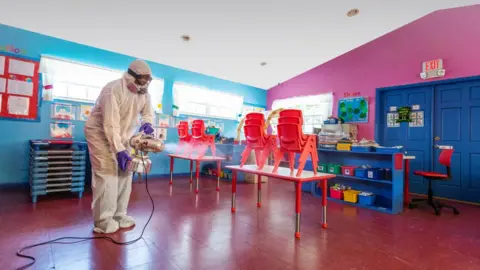Covid: Plea to end remote teaching 'postcode lottery'
 Getty Images
Getty ImagesThe threat of more disruption to face-to-face lessons means the "postcode lottery" of remote teaching standards must end, a parents' group says.
A study suggested Wales had the lowest provision of online lessons across the UK when schools were closed during the national lockdown.
One parent told BBC Wales their children were given "next to nothing" to do at home during the summer term.
The Welsh Government has provided remote learning advice to schools.
This includes guidance on live-streaming and video-conferencing, it said, but it was for schools to decide what the right blend of learning was for their pupils.
On Friday, Education Minister Kirsty Williams said 252 schools had reported a Covid-19 case within the previous 21 days, while 1,299 schools had no cases.
Schools are sending home class "bubbles" for two weeks of "remote learning" if a pupil or staff member tests positive for Covid-19.
During the summer, parents across the UK spoke of their home schooling "hell".
 Ceri Reed
Ceri Reed
Parents' Voice in Wales said the "postcode lottery" in remote learning provision in schools across Wales needed to be addressed.
Director Ceri Reed said: "What we hope is that if there is another lockdown that virtual teacher-led lessons will be issued straight away.
"We want daily interaction between teacher and pupils to help engagement. This will also help learners with additional needs, which is at least 23% of all learners.
"Over the summer term, some were just given online work; a minority were having virtual lessons."
Live online learning
One parent, who worked from home through lockdown with two secondary-age children, told BBC Wales their school had provided very little for them over the summer term.
"They assumed everyone was digitally excluded and traumatised. They didn't cater for kids who could work and wanted to," they said.
"Some work was uploaded, but there wasn't any live online learning, which the majority of fee-paying schools were providing.
"That would have been more effective... assuming everyone could have online access.
"All the safeguards around live-streaming could have been addressed."
 Getty Images
Getty ImagesSingle parent and school dinner lady Ripa Kadir, from Cardiff, said her 12-year-old daughter was given an iPad by her high school, but she could not afford a laptop for her eight-year-old son, leaving the children "fighting over one device".
After a month, a charity provided him with a laptop. His school "was good", setting work every day and phoning regularly.
However, she had to be with him "all the time", and she was not confident she could help him with everything.
"Kids know when they are in front of the teacher they can't mess around - I think online classes would have helped," she said.
Another parent told BBC Wales their child had not yet been able to return to school for health reasons, and has so far not received any education from their school this term.
They also said during lockdown the school's remote learning tasks were not adapted for their child's special educational needs.
'We're in a better place than March'
Eithne Hughes, director of the Association of School and College Leaders Cymru, said schools were working incredibly hard on "plan A" - staying safe and open.
"It is quite a challenge to provide remote education in addition to delivering classroom teaching, but schools are nevertheless doing their very best on this front," she said.
"They have learned a lot from the experience of lockdown and we are now in a much better place than we were back in March."
However, she said the success of remote education was not entirely within a school's power because not all children had access to a device or a good internet connection.
She added they would be happy to work with the Welsh Government to identify where and how to provide support.
 Getty Images
Getty ImagesPlaid Cymru's education spokeswoman Sian Gwenllian said the priority was to keep schools open, but if remote learning was the only option this must include "access to live-streaming of lessons, and regular contact between school and all pupils".
In England, ministers are using emergency powers to require schools to offer pupils who are not in school the same lessons as those in class.
The Welsh Government said it had not seen evidence that using emergency powers in this way was needed "to support learning at this time".
A spokesman said schools and councils had been given guidance to help ensure children who could not attend school due to Covid-19 could learn at home.
He said 25,000 digital classrooms had been added to the educational Hwb website since September, more than the whole of the previous academic year.
"Teachers are delivering a range of blended learning activities which also support learners who are isolating at home," the spokesman said.
He added they had provided 9,717 software licences for digital devices for pupils and 10,848 Mi-Fi devices to get households online.
